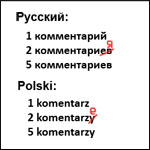
This post is available on russian language.
Support Forum for this plugin.
Features
- Multilingual
- Correct performing for strings containing HTML tags
- No changes for “only-numeric” strings
Available languages
- English (of course)
- Russian
- German
- Polish
- Belorussian
- Ukrainian
- Czech
If you have created your own language pack, or have an update of an existing one, you can send .po and .mo files to me (minimus AT www.simplelib.com) so that I can bundle it into multilingual-comments-number. If you not familiar with po, mo, gettext etc., you can jast send comment to this post with translation of five strings (or more if needed):
- No comments
- One comment
- 21 comments
- 22 comments
- 25 comments
Do not translate numbers, only words! Do not forget write language of translation!
Installing
- Upload plugin dir to the
/wp-content/plugins/directory - Activate the plugin through the ‘Plugins’ menu in WordPress
- That is all.
Download
Multilingual Comments Number
Adds correct multilingual comments numbering to wordpress blog.
Author: minimus, version: 2.0.24, updated: November 14, 2024,
Requires WP version: 3.0 or higher, tested up to: 6.7.2.
Download (13 016 hits) 
© 2009 – 2011, minimus. All rights reserved.









Как сделать поле ввода комментария как у вас в стиле mceEditor?
Total Comments by slavbase: 2
Плагин MCE Comments …
Total Comments by minimus: 167
Спасибо
Total Comments by slavbase: 2
[…] More info you can see on the plugin page […]
Что-то не работает лпагин из коробки. WP стоит версии 3.4.2. Поставил руссифицированную тему, а там как раз не перевели “one response”,”2 responses” и т.д.
Поставил Ваш плагин, активировал. Настроек у плагина нету (или я их не нашел). Но 2responses так и осталось на английском..
Total Comment by Pablo: 1
[…] More info you can see on the plugin page […]
Основной язык на сайте English, хочу добавить Русский. Поможет ли мне этот плагин?
Просто хочу иметь два флажка для выбора языка.
Для сайта использован темплэйт.
Спасибо
Total Comment by Frank: 1
Нет…
Hey, it’s great extension, I’m from Czech republic and plugin works very well in older WordPress versions. Now I’ve installed new version of WordPress (3.6) and the plugin doesn’t load even in plugin list. Please can you fix it. Thanks. Michal
Total Comment by Michal: 1